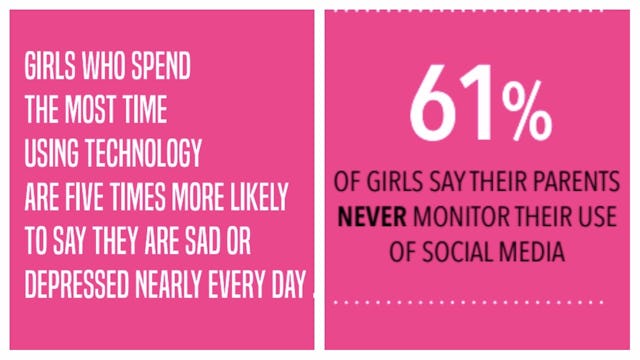We Need To Talk About What Social Media Is Doing To Young Girls

Excessive social media use has a lot of negative effects on young girls, according to a new study
Our children will never know a world without social media in it. There will be no learning curve for Instagram, Twitter, and Snapchat for their generation. Most of them already have every social media outlet mastered well before they reach high school age. But of course, with great technology comes great responsibility. And, according to a new study, the burden of social media on teenage girls especially is a heavy one.
Nonprofit organization Ruling Our eXperiences (ROX) recently conducted the first-ever, large-scale national survey with over 10,000 girls in grades 5-12. The purpose of the study was to “develop a deeper understanding of the thoughts, experiences, perceptions, beliefs, behaviors and attitudes of teen girls throughout the United States” according to the ROX website.
Dr. Lisa Hinkelman, Ph.D., tells Scary Mommy she was inspired to conduct the study after spending nearly a decade researching the pressures facing young girls. “I wanted to be able to amplify the national conversation on girls so that we can truly understand their lives and then support them in developing strength and confidence.”
Image via The Girl’s Index
It’s a huge study, no doubt, and covers a lot of ground. The most interesting statistics surrounded the use of social media and its effect on young girls when it comes to bullying, parental monitoring, and self-worth. Not surprisingly, Instagram, Snapchat, and Twitter were the most popular social media apps used by young girls today — Facebook is mostly just for parental political rants and for your Aunt Debbie to complain about her well-done steak from Applebees.
31 percent of the girls surveyed admitted they have been bullied or made fun of on social media. In fact, a large portion of girls polled admitted they’ll even delete posts if they don’t get enough “likes.” Which, for these girls, probably means Instagram. Sharing a cute pic of yourself and not getting as many double-taps as your friends feels harsh to them, and their self-worth is deeply affected by it.
Image via The Girl’s Index
Astonishingly, 61% of girls said their parents never monitor their social media use. At all. In any way. Which is kind of surprising, to be honest, when you think about how easy it is for the wrong people to gain access to our kids online. These girls range in age from 10-18, don’t forget. Age 10 now may not be what it was when we were young, but it’s still very young, regardless. Especially if you consider that 81% of these girls admitted they’ve received friend requests from strangers, and more than half of them accept those requests. By the time they reach 12th grade, 75% of them reported sending sexually explicit photos.
Image via The Girl’s Index
Whew. Look, we all know it happens. That’s probably not news to anyone. But it is a significant number for seniors in high school who don’t necessarily grasp that these kinds of things can easily “live forever” on the internet.
Additionally, social media is universally distracting as hell — across all generations and ages. This is especially true for teen girls, because 18% reported feeling distracted in school because of social media. Well, hell yeah they are. Shit, I used to spend an entire period of algebra penning love letters to my high school sweetheart and then folding them ever-so-precisely into paper footballs. I couldn’t imagine what social media would have done to my GPA back then. The study reported that by the time girls reach high school, they’re spending an average of six or more hours on social media each day, checking their various accounts and apps 10+ times per day.
Image via The Girl’s Index
Which brings us to perhaps the most important point of social media use and young girls: depression. Those who reported using technology for eight hours or more each day were five times more likely to also report feeling sad or depressed on a daily basis.
“Today’s girls do not know a world without social media,” Dr. Hinkelman says. “They are learning how to form and navigate relationships in an entirely different way than previous generations and we — the adults in their lives — often lack the tools to support and educate them effectively. This is a new and different landscape that we must understand in order to equip girls with the skills they need to manage the challenges and pressures that they face.”
While our kids and future generations absolutely benefit from the technology at their fingertips, and while that also means they may not ever know a day without Snapchat filters, maybe as parents we should be stepping in and monitoring their use. Or finding effective ways to engage with them and help them focus beyond their phones and laptops. It can set them up with healthier habits once they’re off to college or out of the house.
This is new territory for us parents and we’re learning right alongside our kids. Studies like this help us be as prepared as possible to be there for our pre-teens and teens as they navigate the social media waters.
This article was originally published on